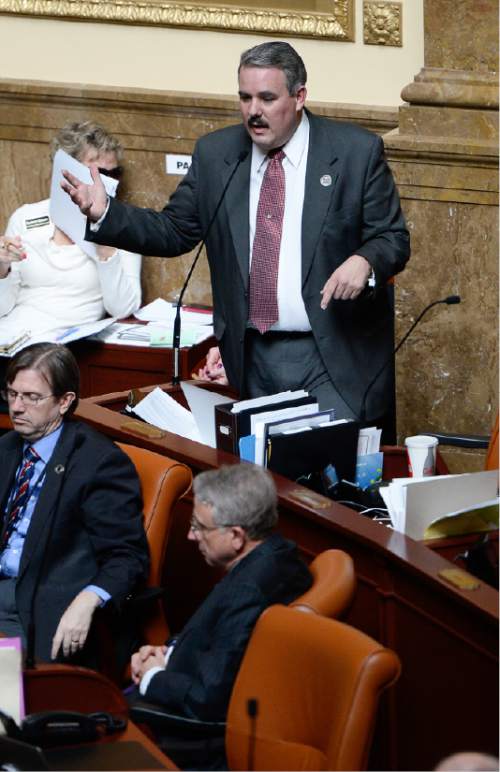This is an archived article that was published on sltrib.com in 2015, and information in the article may be outdated. It is provided only for personal research purposes and may not be reprinted.
The Utah House moved Tuesday to toughen seat-belt laws, but decided to hold off — for now — on a plan that would weaken a texting ban.
House members voted 42-32 to advance House Bill 79 to the Senate. The bill makes it easier to enforce seat-belt laws. They also passed by voice vote a motion to hold House Bill 63, which would make it more difficult for police to issue tickets for texting behind the wheel.
Rep. Lee Perry, a Utah Highway Patrol lieutenant, pushed the seat-belt bill, saying he investigated too many fatal accidents in which seat belts easily could have prevented deaths.
The Perry Republican's bill would make failure to wear a seat belt a primary offense, meaning officers could stop and cite people directly for the lapse. Currently, Utah has a "secondary" law for those 18 and older. A $45 ticket can be issued only when an officer stops a vehicle for another reason.
HB79 was amended to allow only a warning for a first offense. It would also waive a first fine later if a driver were willing to take a free, online safety course. Perry said these changes show the bill's emphasis is education, rather than punishment.
Perry said surveys show "17 percent of Utah drivers do not wear seat belts, but cause 50 percent of the fatalities."
Numerous lawmakers argued the bill would infringe on personal freedom. "Give liberty one win this session," said Rep. Dan McCay, R-Riverton, speaking against the bill.
Perry countered that better enforcement of seat-belt laws does not infringe on freedom any more than enforcing laws against running red lights, speeding or making improper turns.
Rep. Keven Stratton, R-Orem, said at least nine states with primary laws have seat-belt usage rates worse than Utah's — proof, he said, the law is not needed, and just hurts freedom.
Perry argued that unbuckled drivers may not only hurt themselves, but can become projectiles in crashes and injure passengers. They can also lose control of cars more easily during swerving, and cause crashes harming other motorists.
Meanwhile, on texting while driving, Rep. Jacob Anderegg, R-Lehi, said his HB63 would take a step back from a law enacted last year outlawing the manipulation of a phone while driving. Police claimed it was needed because too many people escaped tickets for texting by claiming they were just dialing a phone.
Anderegg said his bill, as now amended, would allow one-button dialing on cellphones with voice commands, and similar one-button commands for music or other apps. It would still allow police to pull over a car if the driver is holding a phone while weaving or showing other unsafe behavior.
The Utah Highway Patrol had opposed the bill in committee, arguing it would again make it difficult to issue tickets for texting. The agency said it has used the law to pull over and cite or warn 1,086 drivers since the law took effect in May.
Numerous legislators questioned the wisdom of taking a step back, and urged more study and work on the bill.
"This is deadly serious," said Rep. Steve Handy, R-Layton, noting that research at the University of Utah has shown that cellphone communication while driving is as dangerous as drunken driving. He opposed the bill.
Rep. Lowry Snow, R-Santa Clara, said the year-old law should be given more of a chance and not changed without an adequate trial period.
On the other side of Capitol Hill, the Senate Transportation Committee on Tuesday passed Senate Bill 162 on a 3-1 vote to toughen last year's anti-texting bill. Sen. Steve Urquhart, R-St. George, who sponsored last year's bill, said it is now time to outlaw use of all but hands-free cellphones for drivers.
"When we are focused on our phones, we are not focused on driving," he said.
The bill was supported by several insurance companies, who noted that research at the University of Utah has shown that cellphone communication while driving is as dangerous as drunken driving.
However, a few citizens and the libertarian Libertas Institute said it goes too far, and would infringe on rights. That bill now moves to the full Senate.



